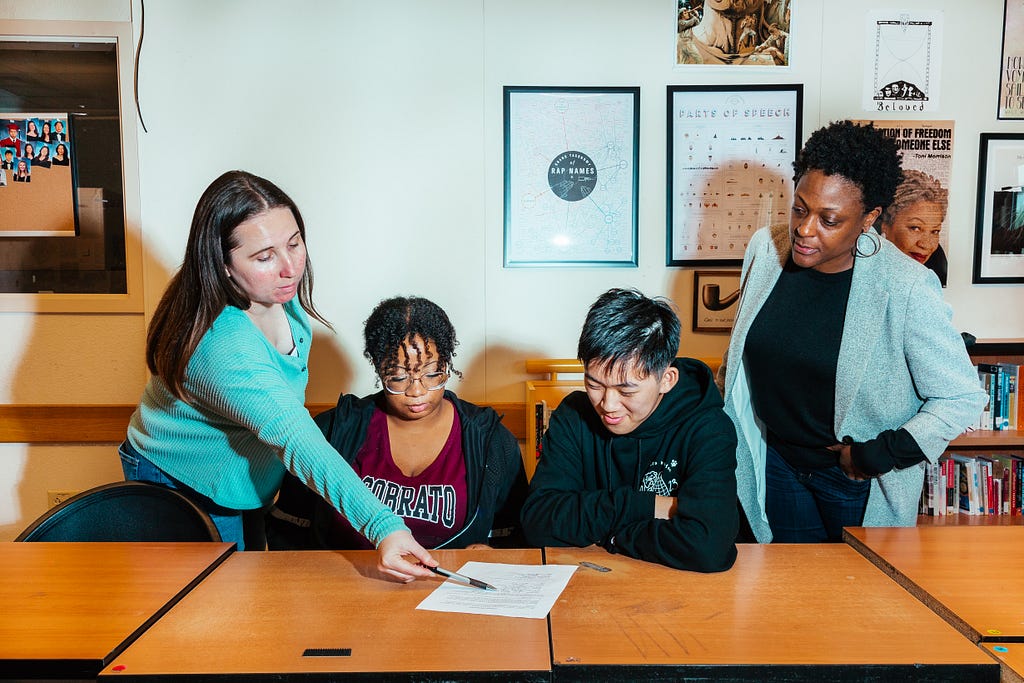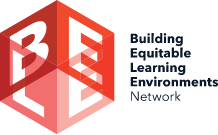Creating a foundation of effective relationships with caregivers
By the BELE Network

CASEL’s latest brief in the BELE Learning Series, Collaborating With Communities and Caregivers: Conditions for Building Authentic Partnerships, focuses on the fourth EA: Partner with Caregivers and Communities.
A community-led racial reckoning at King Elementary began when someone noticed a problem with a mural in the front hallway of the small southeastern school.
In theory, the mural was there to showcase diversity among the student body. Except the students it featured — modeled after former students of different ethnicities — were segregated by race and placed in front of stereotypical landscapes. Is this how King Elementary wanted to represent its relationship with students of color and their communities?
Prompted by the 2020 explosion of honest conversations about race and justice, King Elementary’s staff worked with community partners to replace the mural with a new symbol of the school’s commitment to its students and community.
This work leveraged relationships that King and its CASEL partners had built with the community — particularly caregivers — through parent engagement programs and SEL workshops. Those efforts created three conditions that facilitated the mural project and, in turn, strengthened those relationships. Read about the conditions here:
Condition 1: Schools build and sustain important partnerships through authentically engaging caregivers and community members in consequential ways grounded in local knowledge and an understanding of the school’s place and role in the community.
King Elementary’s home district developed strong ties with caregivers and the community it serves over the past decade. A key part of this effort was bringing caregivers in to offer feedback and ideas when important decisions were made.
The mural project was an opportunity to deepen these relationships and expand the school staff’s understanding of their community: an area where students of color make up 97% of the student body at King. Through close collaboration, King’s staff fully integrated the community with the school to build authentic relationships with caregivers and community members amid its reckoning with race and history.
Condition 2: Schools can structurally establish opportunities for collaboration as a lever for equity and sustain it through intentional, schoolwide professional development.
School-community partnerships connect families to their students’ education learning goals. By structurally integrating support systems for students, staff, and caregivers, King staff were able to align the school’s mission and values with broader community partnerships that expand student learning.
King Elementary saw the benefits of these partnerships during the mural-creation process. Focus group sessions were designed to understand caregivers’ thoughts and hopes about the mural project. They also helped staff envision the school’s future as a space where they feel a sense of belonging, their identities are validated, and they feel empowered to advocate for themselves and their children.
Condition 3: School leadership must build reciprocal, meaningful partnerships with caregivers that center around a vision of the school as a community school, rather than a school within a community.
The staff at King collectively viewed parents as partners in their children’s education — and themselves as key players in building that culture community involvement. When there is trust between a school’s leadership and staff, it’s possible to develop the necessary trust through sustained effort, not one-off actions by a single person. These efforts paid off. When it came time to connect with parents on the new mural, it was staff — not the principal or another high-level administrator — who reached out.
Those connections made King look like a true community school during the mural unveiling event in May of 2022 with over 100 attendees. The new mural was prominently displayed as it overlooked caregivers and their children playing and dancing on the lawn, painting with the school’s art teacher, and eating food supplied by a caregiver-owned restaurant.
Even without an explicit goal, like creating a new mural, districts that value local history and caregiver knowledge — and follow through with action — are better positioned to develop and sustain meaningful partnerships. Though the conditions highlighted in this brief are certainly not the only conditions necessary for BELE Essential Action 4: Partner With Caregivers and Communities, they are a great place to begin.
The BELE Network is dedicated to reimagining our inequitable school system that has failed too many for too long, and is committed to transforming our classrooms into learning environments that nurture the intellectual, emotional and cultural growth of all students — especially students of color. Learn more about BELE on our website, and access the BELE Resource Library to get the best and most up-to-date thinking on how to make learning environments more equitable.
The Collaborative for Academic, Social, and Emotional Learning (CASEL) envisions all children and adults as self-aware, caring, responsible, engaged, and lifelong learners who work together to achieve their goals and create a more inclusive, just world. CASEL has formed a community — spanning classrooms to statehouses — to make social and emotional learning (SEL) part of a high-quality and equitable education for all.


